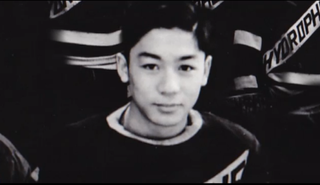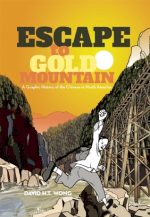Sometimes a book’s message is bigger than the sum of its parts.
Such is the case with David H.T. Wong’s historical fiction/non-fiction hybrid graphic novel, Escape to Gold Mountain (I’ve been trying to settle on a format for titles on this blog, and I’ve decided now: books are underlined!) The “Gold Mountain” of the title is the way early Chinese immigrants referred to Canada and the United States. The message of Wong’s book is particularly resonant, not only for those of Chinese descent, but for anyone impacted by immigration today (i.e. everyone.)
The Particulars
Historical Setting: This traces the experiences of Chinese immigrants to Gold Mountain (note that early Chinese settlers didn’t much distinguish between Canada and the United States) and their descendants, from 1835 to 2011.
Appearances by Historical Personalities: As the story is interwoven with historical events, there are almost too many to count. Those given the most time in this book include: John Sutter, Charles Crocker, Sun Yat-Sen, Emily Carr, Jean Lumb, Frank Wong.
Historical Events Covered: Again, there are too many to list here, but the ones most pivotal to the story are: The First Opium War, the California Gold Rush, the building of the Central Pacific Railroad in the U.S., the Chinese Massacre of 1871, building the Canadian Pacific Railway, the Chinese Exclusion Act, the Chinese Head Tax, and World War II.

Timely Dialogue: “You’ll be one of the only celestials there.”
“Celestial” was originally a flowery way to describe Chinese people. It was coined by 19th century American newspapers in order to show off their vocabulary. The Chinese thought of their Emperor as ruling all under heaven, that is, the Celestial Kingdom. Soon, white Americans gave the term a charged meaning. They contrasted the heavenly meaning of the word with the filth and degradation they frequently associated with Chinese immigrants. It became a form of insult, best not used today, unless you’re Ian McShane in a Western.
Oregon’s Mail Tribune has a very good article on the topic.
 Which Historical Personality Is This Book? Larry Kwong. Known as the first player to break hockey’s “colour line,” Kwong only ever played one game in the NHL. The meaning of that one game far outweighs anything that happened in the game itself. Like this book, the message was bigger than the sum of its parts.
Which Historical Personality Is This Book? Larry Kwong. Known as the first player to break hockey’s “colour line,” Kwong only ever played one game in the NHL. The meaning of that one game far outweighs anything that happened in the game itself. Like this book, the message was bigger than the sum of its parts.
My Review
The story starts in the 1840s with a young Chinese man, Wong Ah-Gin. After losing the Opium War, when the British Empire pushed drugs on the Chinese people under force of arms, China struggles to pay the extortionary penalties imposed by Britain. Desperate to escape poverty in his home village, Ah-Gin stows away on a ship bound for America. Landing in California in 1849, he works at a saw mill just in time to see gold discovered on the property.

Hearing this story, those back in China dub the land across the Pacific “Gold Mountain.” Many make the difficult journey in search of fortune to support their families. The whites who “came to America first” resent their presence. Then and now, bigots rarely have a sense of irony.
So begins a cycle of exploitation then persecution. Chinese workers are greedily recruited from overseas because of their willingness to work for low wages. They work under horrific and dangerous conditions. Once the work is done, they aren’t given passage back home, like they were promised. That would be too expensive. It’s easier to just run them out of town through persecution violence. And when the next batch of hard work needs doing, the cycle repeats.
With China still suffering from civil strife and foreign invasions, the Chinese in Gold Mountain will likely die if they go back. But racist anti-immigration laws also prevent them from bringing families over. For decades, until the 1940s, Chinese settlers, mostly single men, eke out an existence, often finding support from other persecuted minorities. Simply starting a family is a colossal hurdle to overcome. Wong Ah-Gin is one of the lucky ones, and the story continues through the eyes of his adopted son and his ancestors.
The laws finally changed, not just because of well-meaning white liberals, but because the Chinese themselves became politically active. This book recounts these changes as it weaves in elements of the fictional tells this story by weaving in elements from the fictional Wong family’s story.
The latter part of the graphic novel breaks down at this point. It becomes more of a list of Chinese-Canadian and Chinese-American milestones. Yet the story still had an impact on me. My parents benefited from these milestones, able to move to Canada and live as something other than a second-class citizen.
While I’ve long known of the early Chinese who came for the gold rush or to build the railroads, I’ve often wondered about years between then and my parents’ arrival. How did Chinese people keep coming when the laws excluded them. How did they manage when those laws forcibly separated families? How did things change?
Escape to Gold Mountain answers those questions. Even for someone with a keen interest in history, it was full of revelations.
Positives:
- Deftly weaves the personal struggles of the Wong family with real events and personalities
- Meticulous research that includes recreating original photographs
- Several segments pack a strong emotional punch
Negatives:
- A static drawing style lacks immediate appeal
- Some of the narrative and panel layouts are confusing and difficult to follow
- The last section of the book is more of a list of historical events than a story
When they’re old enough, I want my kids to read this. It’s easy to be complacent when you’re considered a “model minority.” They cannot forget that the struggles of refugees today are the same struggles their forebears went through. So even though I might rate this book as “ok,” it’s essential reading, which is high praise of another sort.
Final Rating:
★★★½ (of out 5)